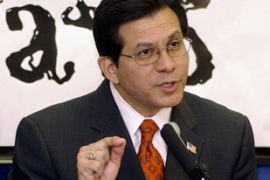White House rejects subpoenas
US president rebuffs congress directives in the row over fired federal prosecutors.

Presidential privilege
Executive privilege is a legal doctrine which allows the president to refuse to produce documents and evidence demanded by another branch of government, if he deems it vital that they remain confidential.
Fred Fielding, White House counsel, said in a letter to the chairs of the House and Senate judiciary committees: “I write at the direction of the president to advise and inform you that the president has decided to assert executive privilege.”
The Senate judiciary committee issued subpoenas against Taylor on June 16, seeking her testimony and further information.
The panel also sought to force the White House to provide further documents.
The House of Representatives judiciary committee meanwhile sought to compel testimony from Miers, a failed supreme court nominee.
Controversial dismissals
The showdown erupted over claims that Gonzales fired eight federal prosecutors last year purely for political reasons to benefit Bush’s Republican party.
The attorney general has denied the charges.
Bush has resisted pressure from Democrats and members of his own Republican party to fire Gonzales.
The attorney general was linked to the row in March after evidence and testimony given by a former aide.
On another legal front on Wednesday, the Senate judiciary committee issued subpoenas against the White House and the office of Dick Cheney, the US vice-president, over a wiretap programme conducted without a warrant.
The subpoenas sought documents relating to the programme of eavesdropping on international emails and telephone calls adopted after the September 11 attacks in 2001.